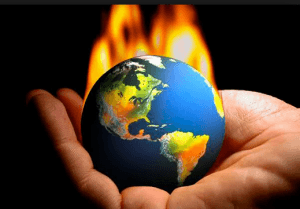Africa must have a say in Climate Change discussions
 Ms Nehza Alaoui M. Hammdi, Ambassador of the Royal Kingdom of Morocco, has urged African countries to speak up about climate change and not be forced to choose between development and preservation of the environment.
Ms Nehza Alaoui M. Hammdi, Ambassador of the Royal Kingdom of Morocco, has urged African countries to speak up about climate change and not be forced to choose between development and preservation of the environment.
She said Africa and other developing countries are the most vulnerable to the effects of climate change as its economy is mostly based on rainfall-dependent agriculture, and thus should have a say in the debate on issues of climate change.
Ms Hammdi stated this at the opening of the 5th Climate Change and Population Conference (CCOP-Ghana) on Africa organised by the Regional Institute for Population Studies (RIPS) of the University of Ghana, and the IDRC of Canada.
She noted that the region is facing unprecedented environmental challenges, which are not just climate challenges but more importantly involves development challenges.
“Africa should have a say in the global debate. It should neither keep quiet nor allow itself to be dictated to, let alone to be forced to choose between development and the preservation of the environment,” she stated.
Ms Hammdi said according to a report by the United Nations Intergovernmental Panel on Climate Change (IPCC), the African continent is particularly vulnerable to the effects of climate change due to factors like poverty, inequitable land distribution and over dependence on agriculture without irrigation.
This could worsen current trends, affecting areas such as electricity production, industrial productivity, public health, water supply and sanitation systems, among others.
She also noted that agriculture, which is the main economic activity and foreign exchange earners on the African continent, is most vulnerable to climate change, especially as most of the countries suffering from water stress are in Africa.
“The climate change effect is the ultimate injustice suffered by the most vulnerable. The consequences of climate change are affecting developing countries as much as, if not more than developed countries and in this regard Africa deserves special attention.”
She said the Kingdom of Morocco is committed to south-south cooperation to address environment and climate change issues and would celebrate such cooperation at the 22nd Conference of the Parties of the UN Framework Convention on Climate Change (COP22) to be hosted by Morocco in Marrakesh.
Professor Ernest Aryeetey, Vice Chancellor of the University of Ghana and Chairman for the opening of the three-day conference on the theme: “Building Bridges, Research –into-use”, said the University is very interested in Climate Change thus the establishment of the RIPS to bring together different groups of academics with interest in climate change.
He noted that the creation of the Center of Excellence on Climate Change Adaptation is in recognition of the fact that there is a fairly large number of people interested in the subject.
Prof Aryeetey said the working group is also to give the African Researcher a voice in discussion on climate change, which is lacking on the global stage.
He said it would be easier to make African voice louder if African researchers come together as a group to influence discussion.
He said an African Research Universities Alliance (ARUA) was recently created to provide an opportunity for increased research by the 16 strongest universities in Africa including the University of Ghana.
He urged participants at the conference to show interest in and take advantage of such Alliances.
“It is my hope that the work you are doing through this conference will feed into the work of ARUA because it will be the largest collection of serious African researchers,” he noted.
Dr Delali Dovie, Chair of the Local Organizing Committee of the CCOP-Ghana said the conference had over years provided an alternative for scientist in Africa to participate in an international conferences and had greatly impacted on participants; producing various projects which are being implemented.
He also expressed the need for science and research into climate change that is focused on Africa in order to better strategies for addressing climate change issues in African countries.
Source: GNA
